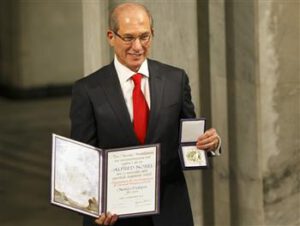The Turkish director of the organization tasked with ridding the world of chemical weapons picked up the body’s Nobel Peace Prize in a ceremony in Oslo on Dec. 10, while noting that he hoped the prestige would accelerate a global ban on the arms.
 “It is my fervent hope that this award will spur on efforts to make the Chemical Weapons Convention a truly universal norm,” said the Organization for the Prohibition of Chemical Weapons (OPCW)’s director general, Ahmet Üzümcü, adding that no weapon “has a monopoly on cruelty or lethality, but chemical weapons have, by any measure, an especially nefarious legacy.”
“It is my fervent hope that this award will spur on efforts to make the Chemical Weapons Convention a truly universal norm,” said the Organization for the Prohibition of Chemical Weapons (OPCW)’s director general, Ahmet Üzümcü, adding that no weapon “has a monopoly on cruelty or lethality, but chemical weapons have, by any measure, an especially nefarious legacy.”
“You cannot see them. You cannot smell them. And they offer no warning for the unsuspecting,” Üzümcü said as he collected the $1.2 million award in Oslo on behalf of the group. The Hague-based watchdog was thrust from obscurity into the spotlight this year because of its lead role in organizing the destruction of Syria’s chemical weapons. The Norwegian Nobel Committee’s Oct. 11 announcement that the OPCW won the NobelPeace Prize for its efforts has further elevated its reputation.
The body notably intends to use the monetary award that comes with the prize in the ceremony to establish its own annual honor. “Hopefully in the near future we will be able to do away with a whole category of weapons, chemical weapons,” said the chairman of the Norwegian Nobel Committee, Thorbjoern Jagland. Both Jagland and Üzümcü paid tribute to the late Nelson Mandela, who shared the Nobel Peace Prize with F.W. de Klerk in 1993.
“This is a great honor for me, to be here 20 years after Nelson Mandela,” Üzümcü said before the ceremony. “He was a source of inspiration to all of us, to our generation, and I’m sure to future generations too.”
Norway’s royal couple, King Harald V and Queen Sonja, was among the guests in Oslo’s City Hall, which was decked out with red orchids and berries.
Members of the Norwegian government were also present, with the notable exception of Prime Minister Erna Solberg, who was attending the memorial ceremony for Mandela in South Africa.
The honor bestowed on the OPCW brings it into an elite group of people and organizations seen as having promoted peace in the world. Since the global ban on producing and storing chemical weapons came into force in 1997, 190 nations have signed up to the Chemical Weapons Convention administered by the OPCW.
More than 80 percent of declared chemical weapons have been destroyed. But, as the OPCW itself underlines, the job is not yet complete. Six states remain outside the convention: Israel and Myanmar have signed the pact but not ratified it, while Angola, Egypt, North Korea and South Sudan have failed to do either.
“I see no reason for any country” not to implement the convention, Üzümcü said. “I sincerely hope [the others] will reconsider and join this Chemical Weapons Convention.”
Among convention members, the United States and Russia have both pledged to scrap their chemical weapons, but failed to meet a 2012 deadline to do so.
The OPCW’s reception of its Nobel Peace Prize comes at a time when it faces its most logistically challenging task ever: destroying chemical weapons from Syria, which became a member in October. Syria’s hasty adherence to the convention averted strikes by U.S.-led forces after a nerve gas attack that killed hundreds on the outskirts of Damascus on Aug. 21.
A roadmap adopted last month by the OPCW to rid Syria of its chemical stockpile says “priority” weapons must be removed from the country by Dec. 31. Before receiving the award, Üzümcü told Agence France-Presse that destruction of the weapons could begin in early 2014.
“We hope that by the end of January, the destruction on the American ship can start,” he said. The Syrian weapons are to be destroyed aboard the U.S. Navy’s MV Cape Ray, a 200-meter cargo ship equipped with two hydrolysis systems.
But Syria’s chemical arms must first be transported through a war zone to the Mediterranean port of Latakia. “Much will depend in fact on the security situation and unfortunately the security situation has deteriorated over the past weeks,” Üzümcü said. “There could be some slight delays but I’m not that worried about delays.”
HDN















